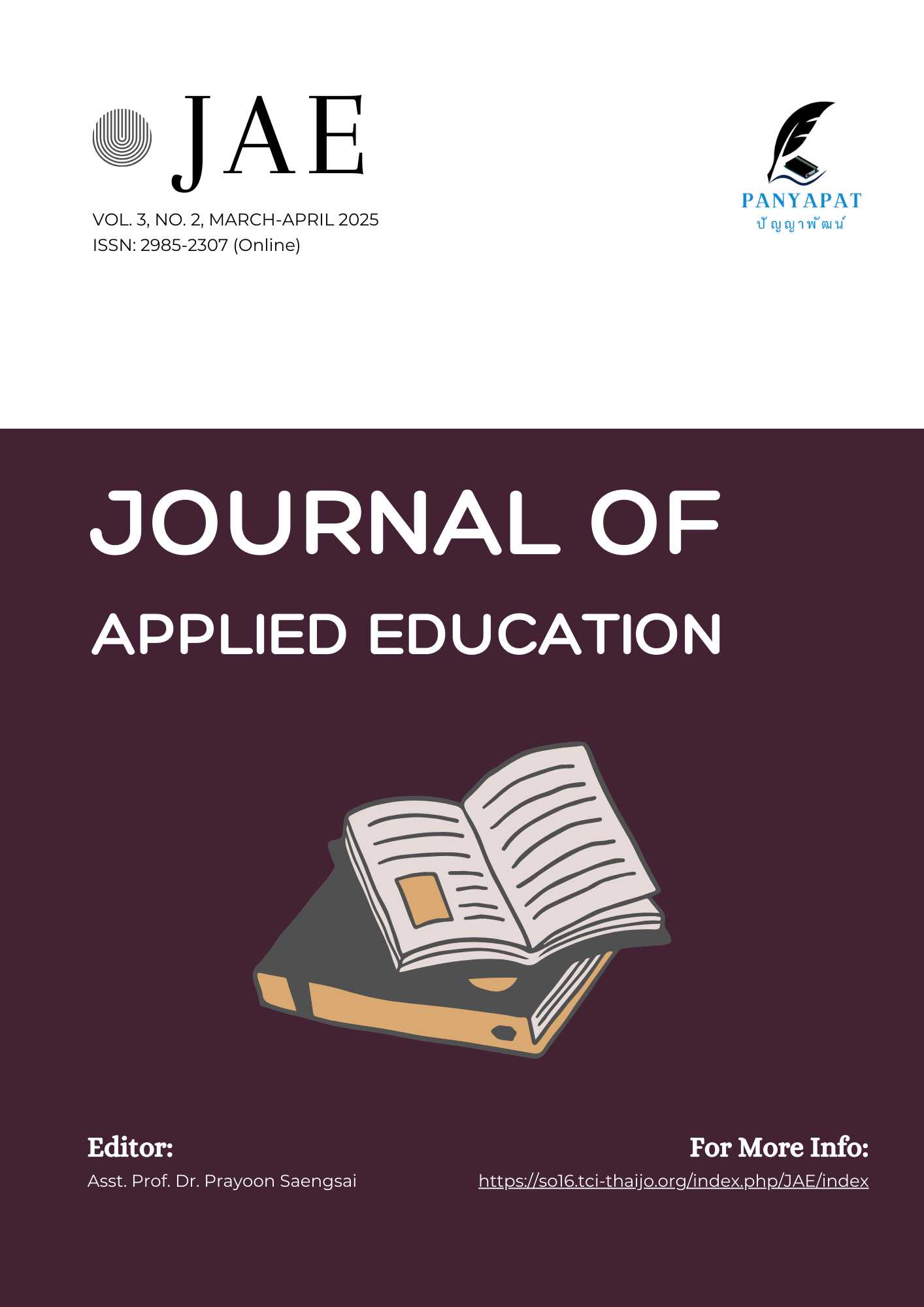The Development of Grade 5 Students’ English Writing Skills Through the CIPPA Teaching Model and Upskill Activity Sets
Main Article Content
Abstract
The objectives of this study were to: (1) develop teaching methods using the CIPPA model and upskill activity sets to enhance Grade 5 students’ English writing skills, (2) compare the students’ English writing skills before and after instruction using the CIPPA model and upskill activity sets, and (3) examine the students’ satisfaction with the CIPPA model and upskill activity sets. The participants in this study were 28 Grade 5 students during the second semester of the 2023 academic year at Bangkok School, Kuengnai District, Ubon Ratchathani Province. They were selected using purposive sampling. The research instruments used in this study included: 1) upskill activity sets, 2) lesson plans, 3) a pretest and posttest, and 4) a student satisfaction questionnaire. The statistical measures employed in determining the results included percentage, mean, and standard deviation. The results of both the pretest and posttest were analyzed through comparison using a dependent samples t-test. The findings of the study were 1) The implementation of the CIPPA teaching model combined with upskill activity sets yielded optimal development of English writing skills among Grade 5 students. 2) Students' English writing skills significantly improved after implementation of the CIPPA model and upskill activity sets, as indicated by a statistical significance of 0.5. 3) Students expressed very high overall satisfaction with the teaching methodology that incorporated both the CIPPA model and upskill activity sets.
Article Details

This work is licensed under a Creative Commons Attribution-NonCommercial-NoDerivatives 4.0 International License.
References
กระทรวงศึกษาธิการ. (2560). หลักสูตรแกนกลางการศึกษาขั้นพื้นฐาน พุทธศักราช 2551 (ฉบับปรับปรุง พ.ศ. 2560). กรุงเทพฯ: โรงพิมพ์คุรุสภาลาดพร้าว.
กัลยา แข็งแรง. (2559). หลักการสร้างแบบฝึก. (พิมพ์ครั้งที่ 7). กรุงเทพฯ: สุวีริยาสาส์น.
กุลธิดา คนเสงี่ยม. (2557). การศึกษาผลสัมฤทธิ์การเขียนภาษาอังกฤษโดยใช้รูปแบบการสอนซิปปาของนักเรียนชั้นมัธยมศึกษาปีที่ 1 โรงเรียนวัดพรหมเพชร. วารสารสุทธิปริทัศน์, 28(87), 236-251.
ทิวาพร โพธิ์หลวง. (2563). การพัฒนาแบบฝึกทักษะการอ่านและการเขียนภาษาอังกฤษเพื่อพัฒนาผลสัมฤทธิ์ทางการเรียน กลุ่มสาระการเรียนรู้ภาษาต่างประเทศ (ภาษาอังกฤษ)ชั้นประถมศึกษาปีที่ 5 โดยใช้การจัดกิจกรรมการเรียนรู้ตามรูปแบบซิปปา (CIPPA Model) ร่วมกับการจัดการเรียนรู้ด้วยเทคนิคแบ่งกลุ่มผลสัมฤทธิ์ (STAD). สืบค้นจาก http://old.thaigoodview.com/node/230644#google_vignette.
ทิศนา แขมมณี. (2562). ศาสตร์การสอน องค์ความรู้เพื่อการจัดกระบวนการเรียนรู้ที่มีประสิทธิภาพ. กรุงเทพฯ: โรงพิมพ์แห่งจุฬาลงกรณ์มหาวิทยาลัย.
นุชลี อุปถัมภ์. (2558). จิตวิทยาการศึกษา. (พิมพ์ครั้งที่ 4). กรุงเทพฯ: จุฬาลงกรณ์มหาวิทยาลัย.
บุรัสกร ธรรมขันธ์. (2563). การพัฒนาความสามารถในการอ่านจับใจความภาษาอังกฤษ โดยใช้การจัดการเรียนรู้แบบ CIPPA MODEL ร่วมกับ แอพพลิเคชั่น Plickers สำหรับนักเรียนชั้นมัธยมศึกษาปีที่ 2. (ครุศาสตรมหาบัณฑิต, มหาวิทยาลัยราชภัฏอุตรดิตถ์).
รัชดาภรณ์ พิมพ์พิสิฐถาวร. (2561). การพัฒนาความสามารถในการเขียนภาษาอังกฤษด้วยแบบฝึกทักษะสำหรับนักเรียนชั้นประถมศึกษาปีที่ 5. (ศึกษาศาสตรมหาบัณฑิต, มหาวิทยาลัยศิลปากร).
Marashi, H., & Dadari, L. (2012). The Impact of Using Task-based Writing on EFL Learners' Writing Performance and Creativity. Theory & Practice in Language Studies, 2(12), 2500-2507.

